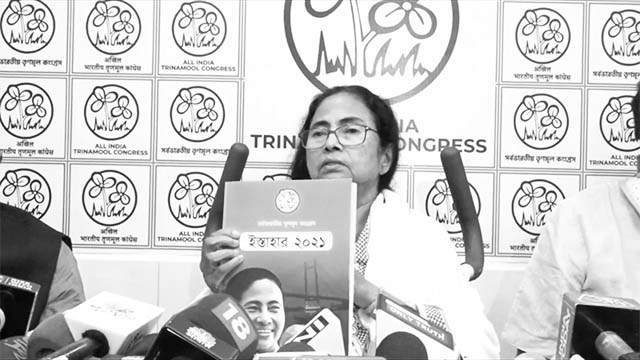
Not just the BJP: The TMC dupes West Bengal farmers too
Chief Minister Mamata Bandopadhyay-led Trinamool Congress (TMC) has published its election manifesto for the 2021 West Bengal Assembly elections. In this manifesto, the TMC has tried to uphold its vision for the next five years and also showcased its purported achievements of the last ten years. The TMC’s manifesto is more of rhetoric than any worthy substance. It betrays the cause of the farmers and doesn’t show any path leading to the welfare of the peasantry. Alike the Bharatiya Janata Party (BJP), the TMC dupes West Bengal farmers as well.
The TMC’s manifesto emphasises the Krishak Bandhu scheme. But the scheme’s benefits are not reaching everyone. To be a “Krishak Bandhu” farmer, one needs to register using the agriculture land documents. But out of 7.2m farmers in West Bengal, around 4.2m don’t have land documents, despite owning land. The TMC’s manifesto does not address this problem. Bandopadhyay obliterated 4.2m farmers in one stroke from her next five-year plan. This is a stark example of how the TMC dupes West Bengal farmers in its election manifesto.
At a time when the north Indian farmers are demanding a legal guarantee for the minimum support price (MSP) of crops, Bandopadhyay’s manifesto doesn’t spare a single word on the issue. Time and again, the news of farmers suicide, distress come; a legally-guaranteed MSP can solve this perennial problem. However, the Modi regime is reluctant to provide any such legal guarantee to the farmers. In this, Bandopadhyay stands with the BJP.
Bandopadhyay has been supporting the farmers’ agitation against the Modi regime since its inception, at least through lip service. She calls her government a Maa Mati Manusher Sarkar (the government of the mother, the soil and the people). But by remaining mum on legally guaranteeing an MSP for crops, Bandopadhyay exposed her hypocrisy.
The TMC’s manifesto distanced itself from the Mati (soil) whose original holders have not been taken into consideration. In Alipurduar, a northern district, the farmers are dumping tomatoes on the roads to protest the low prices in the market. The farmers are offered price as low as Rs 2 per kg for the tomatoes in Alipurduar. This, amid an ongoing election, shows the condition of the farmers of the state. Since ascending to power in 2011, every time the TMC dupes West Bengal farmers, it digs its own grave.
Potato is one of the four main cash crops of West Bengal, but the farmers are getting a very low price, which has thrown the farmers into an abyss of sheer crisis. The TMC government has decided to give Rs 6 per kg as MSP, which will not even meet the input costs. The farmers depend on selling the present harvest not just for their survival, but to also garner investment for sowing the next crop. When the farmers incur losses in one crop, the entire production cycle is harmed. So, a legal guarantee of the MSP will at least provide them with some fallback option and save them from destitution. Alike the BJP, the TMC dupes West Bengal farmers on the issue of MSP for all crops.
In their manifesto, Bandopadhyay’s Party has given importance to increasing agricultural production. But without proper management of surplus production in place, increasing production will only lead to the woe of the farmers. The number of cold storages for perishable vegetables is low. According to The Telegraph, at present, there are 585 such facilities, of which 483 are for storing potatoes, 23 that can store potatoes as well as other vegetables and fruits, and 79 facilities can store all types of crops. The TMC’s manifesto is selling unrealistic dreams to the farmers.
The TMC’s manifesto talks about increasing production but how–the question remains unanswered. West Bengal needs about 26m eggs daily while it produces only 18m and the deficit is meted out through supplies from nearby states. But in the TMC’s manifesto, there is no plan for increasing egg production to be self-sufficient in the poultry industry. It has neither shown any roadmap to boost the poultry industry which suffered immensely due to the pandemic.
The much-hyped Sufal Bangla scheme, which, according to the TMC government, is a flagship project and a huge success is largely concentrated on the capital city Kolkata. Out of 47 static and 97 mobile counters, only Kolkata has 24 static and 92 mobile counters. This data hollows out Bandopadhyay’s government’s claim of humongous success.
The cash crop potato seeds are brought by the farmers often at high prices from other states, mainly from Punjab. Therefore, it increases the input cost of potato farming. The TMC’s manifesto also fails to give any guarantee of the government’s effort to bring indigenous seeds into the market to reduce the input cost.
From the farmers’ perspective, the TMC’s manifesto is Bandopadhyay’s attempt to amplify her cacophony and cover up her failures in the agriculture sector with no hope of redemption in future even if she returns to power. If both parties’ promises are analysed, then the TMC dupes West Bengal farmers without the hullaballoo with which the BJP is duping them. Both parties show that they have no intention to help the farmers, who are the backbone of the state’s economy, to prosper and become self-reliant.
Moumita Alam is a non-conformist. She writes about the exploitation of the marginalised. As a teacher and a poet, her pen flares up against all forms of oppression. She loves to read when not writing and she thinks critically about the socio-political aspects of life. Keen to change the society to an egalitarian one for the present have-nots.
